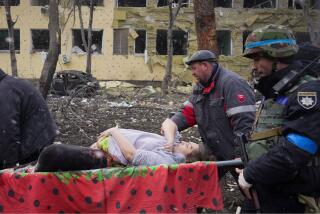‘All Our Voices’ on Public TV Must Include Dissenting Ones
- Share via
The Public Broadcasting Service is airing promotional announcements proclaiming it as the place “where all our voices can be heard, all our stories can be told.”
And last week, to fulfill a congressional mandate, the board of directors of the Corporation for Public Broadcasting approved measures that are supposed to keep programming on public radio and television “objective and balanced” and protected from “any undue influence” (“Public Broadcasting Board OKs Objectivity Measures,” Calendar, Jan. 27).
As that story noted, however, some broadcasters and others are worried that the CPB action could bring program review, interference by the government, manipulation by special-interest groups and have a “chilling effect” on producers.
As a filmmaker who has experienced PBS’ refusal to air an award-winning program on a vital issue, I share that concern.
My film “Building Bombs,” an Academy Award nominee for feature documentary, was rejected for national broadcast on PBS because it “just wasn’t up to snuff,” according to a comment by Jennifer Lawson, head of programming for PBS, in an earlier Calendar story (“Group Protests PBS ‘Self-Censorship,’ ” Jan. 7).
Columbia University’s Erik Barnouw, the dean of American media critics, offered another analysis: “ ‘Building Bombs’ is a brilliant film PBS didn’t dare show for fear of offending the nuclear industry.”
“Building Bombs” focuses on the environmental devastation from the vast amount of radioactive waste created by 40 years of nuclear weapons production at the U.S. Department of Energy’s Savannah River plant in South Carolina.
PBS’ original statement in rejecting “Building Bombs” was that the film “does not give adequate voice to those who are proponents of nuclear arms.”
However, “Building Bombs” has interviews with five atomic weapons proponents: former President Reagan’s Secretary of Energy and four spokesmen provided by the Energy Department and Du Pont. Three scientists and two other experts in the field of nuclear weapons production and waste disposal reviewed “Building Bombs” for factual and scientific accuracy. Not a single fact put forward in “Building Bombs” has been challenged.
Nuclear arms proponents have had wide access to the media for 50 years. Yet how much coverage has been given to the down side--the huge environmental problems resulting from many years of nuclear weapons production?
The General Accounting Office asserts that the clean-up of radioactive waste at the Energy Department’s vast atomic weapons production complex (17 plants in 13 states covering more territory than Delaware and Rhode Island combined) will likely cost U.S. taxpayers an amount greater than the bill for the savings and loan bailout. How many taxpayers are aware of this?
I find it disturbing that “Building Bombs” has been watched on TV all over the world but, due to PBS’ rejection, cannot be seen by broadcast television viewers in the United States. Censorship does not always come labeled as such.
The public has a right to see the many award-winning programs PBS has refused to air, including “Building Bombs,” “Deadly Deception” (an Oscar-winner for documentary short that focuses on General Electric’s role in nuclear weapons production) and “The Panama Deception” (an important alternative perspective to official government and press reports about the U.S. invasion of Panama).
Only if viewers make their voices heard and demand that PBS fulfill its responsibilities as a public broadcaster will the American people be able to see these important programs.
More to Read
The complete guide to home viewing
Get Screen Gab for everything about the TV shows and streaming movies everyone’s talking about.
You may occasionally receive promotional content from the Los Angeles Times.






